
An International Monetary Fund (IMF) mission, led by Ulrich Jacoby, visited Banjul during November 2–15 and December 7–12, 2017, headed to conduct Article IV consultation discussions and review performance under the Staff Monitored Program (SMP) approved in June 2017.
At the end of the mission, Mr. Jacoby issued the following statement:
“The economy has started to recover following the sharp growth slowdown in 2016, which stemmed from a bad harvest, foreign exchange scarcity, and a drop in tourism due to the political turmoil after the presidential elections in December 2016.
Economic growth in 2017 is projected at 3 percent, with a strong rebound in tourism and trade, and renewed interest from foreign direct investors in energy, tourism, agriculture and transportation. Inflation has reversed its rising trend, reflecting the stabilization of the dalasi and a gradual decrease in food prices. With much improved fiscal discipline and external financial support, the dalasi has remained stable since April and international reserves recovered strongly.
“Economic growth is expected to gradually accelerate to about 5 percent by 2020, assuming continued good policy implementation and a significant expansion in electricity supply, expansion of irrigation and commercial farming, investment in the tourism and trade sectors, and continued infrastructure investment. Headline inflation is expected to decline to slightly below the Central Bank of The Gambia’s (CBG) 5 percent target in the medium term.
“Performance to date under the Staff Monitored Program has been broadly encouraging, but more progress is needed. The drastic reduction in government’s net domestic borrowing—stemming from increased donor support, fiscal consolidation and the recent pick-up in domestic revenue—has contributed to the decline in interest rates. Looking ahead, the authorities will need to maintain fiscal discipline and implement the remaining fiscal and structural measures committed to under the SMP.
“The Gambia’s heightened debt stock of 120 percent of GDP that the new government inherited is a serious challenge. Maintaining debt sustainability will necessitate refraining from large-scale investment projects involving loans or contingent liabilities before additional fiscal and borrowing space has been achieved, and leveraging private capital. Careful evaluation and prioritization of investment projects within the due diligence procedures of the Investment Implementation Task Force will be crucial in that regard. Mobilization of additional external resources to foster debt sustainability and implementation of the authorities’ debt strategy will be important to create borrowing space.
“Reform of public enterprises remains critical as they pose significant fiscal risks and contribute to high public debt. The mission welcomes ongoing reform efforts which should continue, including medium-term strategic plans for achieving financial viability.
“The CBG should continue maintaining a flexible exchange rate regime and further rebuild reserves, given external vulnerabilities and the high debt. Safeguarding the stability of the financial sector in light of the decline in interest rates is also a key priority.
“Access to financing remains the most important obstacle to doing business, and private sector credit growth remains sluggish despite the decline in interest rates. Promoting credit information systems and financial literacy as well as strengthening creditor rights and their enforcement would help support private credit growth.
“The mission met with President Barrow, Finance Minister Sanneh, Central Bank Governor Jammeh, other senior government and public enterprise officials, members of parliament, representatives of the private sector, civil society organizations, and development partners.
“The mission thanks the authorities for their excellent cooperation and hospitality, and looks forward to close cooperation in the period ahead.”





AS I predicted in February. The massive withdrawals by the Jammeh regime are to be put as Non recurring expenses. The Gambias’ greatest challenge is the massive debt to GDP imbalance{ said to be %120} No new figure was given. Then how to save without artificial manipulation by government to rationally reject the loss of profit to service like taxi drivers and stall sellers. Indeed the financial recommendation for government to put its own house in order, is the most reasonable direction from the IMF. How will Gambia maintain financial stability from such a high position of internal and external government created Debt.? The Gambian economy should rebound strongly even if there were no government intervention. Its a much tighter situation with a chance that if government don’t mess it up with its never ending loans and expenses and wages.
By 2020…things will only get better.
So lets all sing Take That’s song >>”.Things will only get better ” Will only get better…Yeah !!!! { sings loudly }
On Gambia’s Economic Recovery,
I cannot agree with any economic recovery with figures that are on the table and beyond the layman’s understanding, until I’m assured of every Gambian’s 3-daily meals, children well fed and getting their right to education and the free flow of goods and services into Western markets without bottlenecks.
Unless such standards are set, the whole economic spectrum of “recovery” is bogus and verbos. After all, it comes from the Western imperialist implemented economic vision of “recovery”. How many times have they spoken about economic recovery under Ex-President Jawara when we were stringed to unpayable loans/credits from the IMF and World Bank?
These capital debts and debt servicing still loom on our GDP. They have NEVER been condoned nor forgiven in spite of all the economic hardships our impoverished country went through since independence in 1965. Those debts dragged into the Jammeh administration with whom the Western powers never had any working partnership/relationship.
We don’t want short term economic recovery with ancillary programmes that would not benefit our economy for sustainable development. Therefore, relying on loans/credits/aids would only subject us to DEPENDENCY and more “recovery” undertakings any time our economy slumps or goes into recession.
Our economic/monetary programmes should be focused on harnessing our valuable resources, look into sub-regional and the African/Asian continental markets and forge for equal trade partnership with the West that always abuses our cooperation and resists accepting our crucial farm produce and basic home-made products.
Therefore, our most reliable resources, the youth population and womenfolk, should be seriously and genuinely engaged in all sectors of production and services. This goes with giving lucrative incentives for self-employment and manageable bank credits, adequate training in tertiary professions, cooperative farming, reasonable subsidising of fertilizers and farming machinery, durable storage facilities for all produce and of course MARKETING SOURCES with savings that could be ploughed back into other economic sectors.
With the foregoing CORRUPTION and CORRUPTIBLE practices MUST be severely punished!
Babu/ your understanding is very good. You know more than you know/